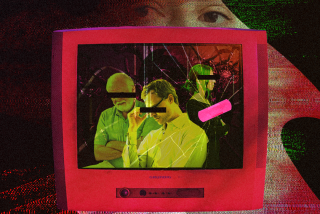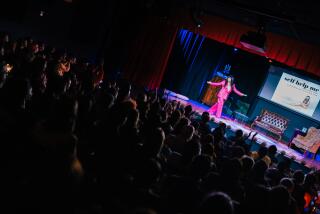‘Miss Daisy’ Protests Drive Home a Bigger Problem
- Share via
Howard Rosenberg’s bizarre defense of the TV version of “Driving Miss Daisy” (“ ‘Miss D.’ Meets the PC Crowd,” Calendar, Aug. 26) sends me scurrying to the keyboard to register my outrage. I’m particularly incensed at his willingness to invoke the insidious phrase political correctness to describe the objections raised against this comedy pilot by people who have wearied of its “benign” stereotyping, and by the skewed process that determines so much of what we see on television.
Much like the Bush-Quayle re-election campaign’s pet phrase family values, the term politically correct has degenerated into annoyingly imprecise and insultingly loaded jargon through its use. Rosenberg demeans some very earnest and sincere criticism of a TV pilot he admits is “not great.” Why then does he pull out the big guns in its defense?
Clearly, he’s outraged at what he perceives to be a double standard and by what, to him, looks like an effort to rewrite history.
The double standard Rosenberg bemoans lies in the angry reaction to the Hoke Colburn character’s written dialogue. He compares it to “black talk” spoken--without similar objection--on “contemporary African-American comedy series” such as Fox’s “Martin” and NBC’s “Here and Now.” I wonder what the writers and producers of “Miss Daisy” expected when they filled their script with black dialect that would have made Stephen Foster blush.
Imagine if a line of dialogue for an Italian immigrant read, “I no spic-a de English,” or if the scripts for “Brooklyn Bridge” read like Jackie Mason spoke in “Chicken Soup.” The stink raised by such stereotyping would dwarf the fabled Southern California smog. To expect any less of a reaction from black folks is frighteningly naive. Perhaps if the producers had left it up to their black actors to determine which “g’s” to drop and when to turn sure into sho, much of the brouhaha could have been avoided and we’d be left to debate the larger issues.
The larger issue for Rosenberg lies in the angry reaction to Hoke Colburn’s silence when he overhears one of Miss Daisy’s guests use the word nigger. This prompts a patronizing little history lesson from Rosenberg, telling us the way of the segregated South circa 1952. We’re piously informed that silence was the only viable course for a black man back then--especially if he wanted to keep his job and his life.
*
Right or wrong in his historical perspective, Rosenberg is still off base. His lecture, like the “Miss Daisy” pilot, hammers home a point we’ve long since wearied of. The producers and the network are trying to profit by taking us someplace we’ve been a few times too many. It doesn’t help that it’s done in the obvious and manipulative tone of the preachy sitcoms we’ve seen so often.
Think about it: The one with the biggest drawl is always the racist, right? The curmudgeonly old fusspots always show their humanity at just the right time, then go back to their cantankerous ways as soon as the danger clears. Worst of all, the black characters display their humanity through a constant, every-dignified capacity to endure pain and insult with either silence or an ironic reading of a line like, “Yes ma’am! We sho will!”
This isn’t about “political correctness.” Nobody’s advocating rewriting history. We’re just saying “look somewheres fo’ the next hit comedy, ‘cause this ‘un sho’ ‘nuff ain’t it. Ya dig?”
Political correctness? Give me a break, Howard Rosenberg. No, scratch that. Give us a break, Hollywood!
Even better, don’t give us anything. Just stop the censorship of exclusion. Let us in the room when development deals are being cut and series commitments are being made, and we’ll contribute some of the common sense that somebody at CBS obviously doesn’t have.
More to Read
The complete guide to home viewing
Get Screen Gab for everything about the TV shows and streaming movies everyone’s talking about.
You may occasionally receive promotional content from the Los Angeles Times.






